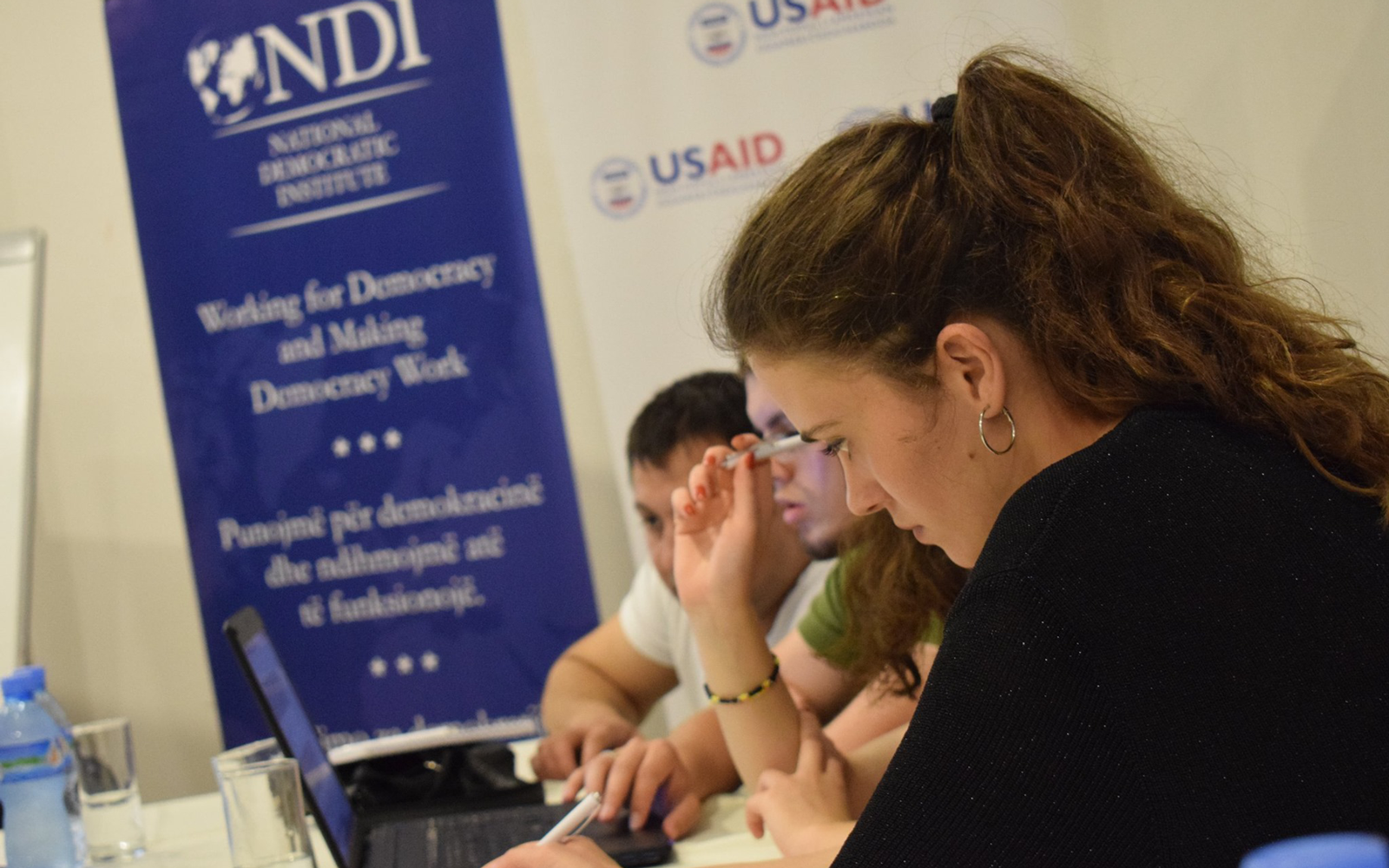
After looking at a recorded committee meeting, program participants/journalists were divided in groups and asked to draft a story about the meeting. Written stories were then shared and discussed with the group.
SHARE
In the Assembly of Kosovo, drama and debate are never in short supply. It remains the focus of journalists’ attention year-round. As social media use becomes more widespread, the public is increasingly accustomed to receiving live updates from the floor of the assembly, where a scandalous statement can go viral in minutes. These updates tend to focus on inflammatory debates between members of parliament (MPs), instead of the important work done by other parts of the assembly, like committees which focus on drafting legislation and overseeing government ministries. While journalists face tangible pressure to post on social media, they also shoulder a responsibility to report ethically and reinforce constructive political discourse. In this context, NDI is helping the media and Assembly of Kosovo develop stronger relationships by building the skills of accredited journalists to report on parliamentary affairs.
NDI has worked closely with the Forum for Parliamentary Transparency and the assembly’s Office for Media and Public Relations to invite accredited journalists to formal trainings to establish more structured cooperation between these journalists and the legislature. There are more than 400 accredited journalists in the assembly, which often struggles to accommodate them and their equipment. These trainings discuss basic coordination issues like how to avoid having multiple cameras crowding the gallery of the chamber during important news events.
NDI also helped create a working group comprised of journalists and the assembly’s media personnel to review and revise media regulations. This serves as the foundation for an improved relationship between the assembly and the media. The working group’s new proposed regulations seek to improve the media’s access to the assembly by addressing a variety of issues like the streamlining accreditation process, improving technological infrastructure for journalists to work in the assembly, and ensuring that there is sufficient space to accommodate journalists and their equipment.
To ensure that journalists understand the full breadth of the work conducted in the assembly, NDI held a workshop for journalists with assembly departmental heads and committee staff to review the broader legislative process, including the work of the various committees.
Through their engagement with assembly staff, journalists were able to raise logistical challenges they face in covering assembly work. The result was a win for both parties. Journalists now have systems in place that will ensure that they have access to the information and material they need, and assembly staff can be confident that journalists will be informed by the most accurate information. Moreover, NDI ensured that the journalists were able to access the tools that the Forum for Parliamentary Transparency had created, such as the Legislative Tracking System and MP profiles, which will prove as useful research and media reporting.
By facilitating these collaborative sessions, NDI has fostered a closer relationship between the assembly and the media, which will be able to collaborate more effectively in the future. Maintaining a constructive relationship between the assembly and the media is integral to NDI’s work of connecting citizens to this democratic institution. As citizens are better informed about the work conducted by the assembly, Kosovo will be primed to make headway on its democratic agenda.
The Assembly of Kosovo adopted the Declaration on Parliamentary Openness in 2015 – codifying its commitment to make the institution more open and transparent. Supported by NDI, the assembly then created the Forum for Parliamentary Transparency, a parliamentary body composed of MPs, civil society, and staff from multiple parties, which works to bring MPs closer to citizens. It does this by organizing town-hall meetings across the country, creating technology solutions for tracking legislation as well as MP performance, and opening the doors of the assembly building for tours, especially to school students.
NDI has consistently supported these initiatives and has also provided direct support to the Assembly’s media and public relations team to develop a coherent social media strategy and launch a Facebook page for the assembly. Taken together, these efforts help ensure that the public is aware of how the Assembly works on a daily basis, beyond breaking news reports from the assembly floor.
NDI’s assistance to the Assembly is funded by the United States Agency for International Development (USAID) through the Consortium for Elections and Political Processes Strengthening (CEPPS).


